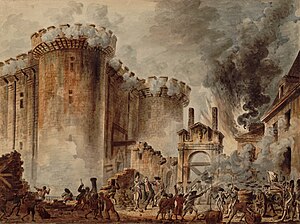| "The Storming of the Bastille" (Photo credit: Wikipedia) |
And that’s a good thing, of course. By and large this country has dispensed with dangerous, labor-intensive work – except in farms, though even then it’s been lessened.
But it’s also a hint of things to come. When I was born, mid-twentieth century we had some innovations and things had gotten cheaper, but the world would have made perfect sense to someone born a century earlier. (Particularly where I lived.) You could take someone from the nineteenth century and plunk them down in the middle of the twentieth, and after some adjustment, they’d go “oh, right, motors are different, carriages have motors, blah blah” but the structure of life would make perfect sense. There would be homes, families, hospitals, schools, factories, office buildings. Once they adapted to the minor tech innovation (and humans are very adaptable.) they’d “get” what was going on well enough.
Now… not so sure. We’re only at the beginning, so they’d still identify a lot of things, of course, and they’d fail to see the significance of the fact that you can communicate instantly, in real time around the world. They’d think it was just a “neat” thing. A lot of people today think that too.
Part of that is because we’re just at the beginning of the revolution. It’s hitting my business first, so I can tell you it’s dispensing with factories, with warehouses, with centralized distribution. It’s a HUGE change.
The change is coming to other fields. Schools are dead, but still walking. Most factories, too, once three-d printing gets going.
Am I saying technology will save us?
Oh, my Lord NO!
Rapid change brings on upheaval. The last change almost (but not) this fast gave us… the French Revolution and its sisters around the world.
It’s going to get rough. It’s going to get really rough. At the end of this where you live will mean far less than where you work, and the two might be half a world apart.
Does this mean territorial location and territorial nations will mean nothing? Well, no. It means stuff we can’t even imagine yet, but not that. After all, my friends are around the world, my publisher is in North Carolina, but I am still affected by a disaster in my area, and how my neighbors live still matters.
What it means, though, is that people will be increasingly more free. The territorial government will mean something, but not as much as it used to: labor regulations/welfare/laws about what you can’t and can’t do for a living – all of this means much less when you can live one place and work the other. The same for what you can do for play. The same for the interest rate that controls what home you can buy. Regional jurisdictions, like NYC who rely on a highly paid work force are going to be upended, because people can work there and live elsewhere. The same, writ large goes for national governments.
I have no idea, none, what the world will look like at the end of this. And neither do you. And neither does anyone else. So called “futurists” are usually missing ten or twenty little points that could be all that determines the future.
But I do know one thing: where you live will still matter, as a locus of culture, law enforcement and neighborliness.
And I know another thing: we’re likely to come out on top. We’re likely to come out on top for the same reason that our elites want a new electorate – because we’re not a normal nation.
We’re the descendants of those who left everything, who acculturated to become something new united not by blood, not by tribe, but by the words of the constitution.
The constitution is more flexible than tribe or blood. The constitution was forged to meet circumstances no one could have foreseen, a new world, new ways of doing things. It was a document supposed to underlie a nation as tough as granite, as flexible as steel. A creature the world had never seen.
There is a reason that for the last hundred years, the future has come from America. Even when inventions are made elsewhere, they are applied and popularized here.
We Americans are more flexible than those who chose to stay behind.
The cowards never left, the weak died on the way and the pusillanimous went back, tail between their legs. (As will many of the new ones, when the teat goes dry.)
Those who became American are crazy people, ready for any challenge.
We are a people of the future. The future can’t scare us because it’s where we come from. We are impatient for it to arrive, curious about what it will bring, excited about our opportunities in it.
Let the elites rule and mandate. You concentrate on what you can do that they never thought of. You create a future they can’t comprehend, much less affect.
Step back from that ledge. You’re an American and you belong to the future.
Read the full article.































